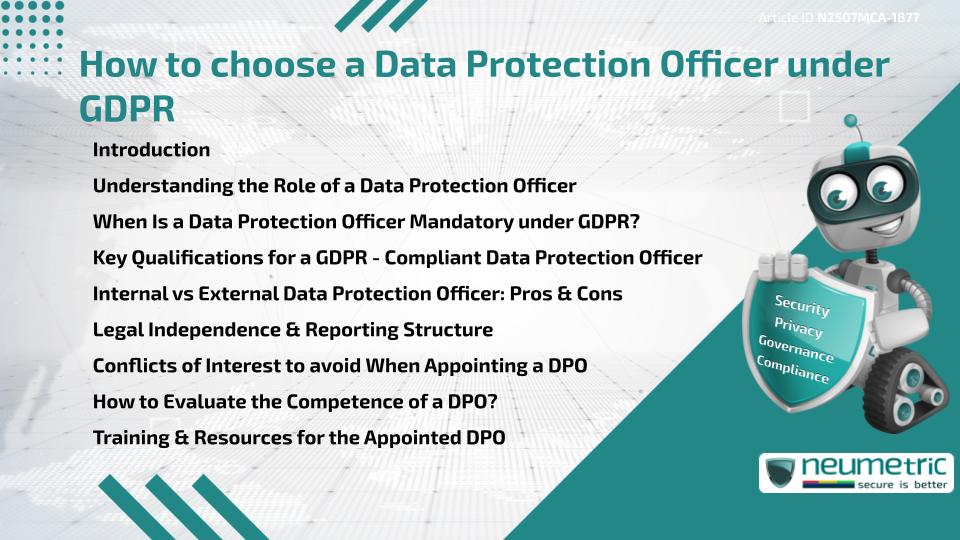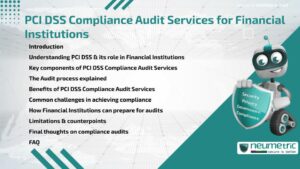Table of Contents
ToggleIntroduction
Under the General Data Protection Regulation [GDPR], appointing a DPO is a legal obligation for many Organisations. More importantly, the choice of the DPO can significantly impact how well an organisation protects Personal Data & maintains Regulatory Compliance.
This article explores how to choose a Data Protection Officer under GDPR by outlining the legal requirements, essential qualification & key practical considerations. Whether your DPO is Internal or External, Full – time or Part – time, selecting the right person is key to upholding Data Protection Principles & avoiding Penalties.
Understanding the Role of a Data Protection Officer
The DPO is responsible for overseeing a Company’s Data Protection strategy & its implementation to ensure Compliance with GDPR. This includes monitoring internal Data Protection activities, raising Awareness, training Staff involved in processing operations & advising on Data Protection impact assessments.
Under Article 39 of GDPR, a DPO’s core tasks also include:
- Informing & advising the organisation & its Employees
- Monitoring Compliance with GDPR & other relevant Data Protection Laws
- Cooperating with Supervisory Authorities such as Data Protection Agencies
Understanding these responsibilities is crucial in deciding How to choose a Data Protection Officer under GDPR.
When Is a Data Protection Officer Mandatory under GDPR?
According to Article 37 of GDPR, appointing a DPO is mandatory when:
- The organisation is a Public Authority or Body, excluding Courts when they are performing judicial functions.
- The organisation’s core activities involve regular & systematic monitoring of Data Subjects on a large scale
- The core activities consist of large – scale processing of special categories of data (such as Health, Racial or Biometric Data)
Even if it is not mandatory, appointing a DPO is considered good practice & may support accountability under GDPR.
Key Qualifications for a GDPR – Compliant Data Protection Officer
The GDPR does not set strict Academic or Professional requirements for DPOs but emphasises that they must have “expert knowledge of Data Protection Law & Practices.” When deciding How to choose a Data Protection Officer under GDPR, consider candidates with:
- Proven expertise in GDPR & national Data Protection Laws
- Knowledge of IT Systems, Data Security & Data processing operations
- Experience in Risk Management & Compliance Frameworks
Fluency in communication & the ability to train others are also vital since the DPO acts as both Advisor & Monitor. The European Data Protection Board offers guidance that further elaborates on these skills.
Internal vs External Data Protection Officer: Pros & Cons
Organisations can appoint a DPO internally or outsource the role to an External Expert or Firm. Each approach has advantages & drawbacks.
Internal DPO:
- More familiarity with internal processes
- May be easier to reach & consult
External DPO:
- Independent & less influenced by Company politics
- Broader experience from working with various Clients
The choice depends on the size & complexity of the Organisation.
Legal Independence & Reporting Structure
GDPR requires that the DPO operate independently, without receiving instructions regarding the performance of their tasks. They must report directly to the highest management level. This ensures:
- Freedom from internal influence
- Proper escalation of Data Protection issues
- Visibility of Privacy Risks at board level
The DPO should not be penalised or dismissed for performing their duties.
Conflicts of Interest to avoid When Appointing a DPO
When considering How to choose a Data Protection Officer under GDPR, Organisations must avoid appointing someone whose other duties create a conflict of interest. For example:
- Chief Technology Officer managing Systems & Security
- Head of Marketing involved in Data – driven campaigns
Such Individuals may influence data processing decisions & cannot objectively supervise them. To avoid regulatory scrutiny, ensure the DPO does not hold roles where Personal Data processing decisions are made.
How to Evaluate the Competence of a DPO?
Choosing a competent DPO means going beyond Resumes & checking real – world application of Skills. Evaluate candidates by:
- Testing their understanding of GDPR Principles
- Reviewing past Compliance initiatives or Audits
- Assessing their ability to communicate Privacy Risks clearly
Peer recommendations, Certifications & Interviews can help validate these competencies.
Training & Resources for the Appointed DPO
Once appointed, the DPO must be supported with ongoing training & resources. GDPR Compliance is a continuous process & the DPO needs access to:
- Updated Regulatory materials
- Legal & Technical consultation channels
- Time & budget for Professional Development
An unsupported DPO is unlikely to be effective. Therefore, when evaluating How to choose a Data Protection Officer under GDPR, consider the support system you will provide to ensure their success.
How to maintain Accountability & Transparency in DPO Appointments
Transparency strengthens trust with Customers, Employees & Regulators. Organisations should:
- Publicly announce the appointment of the DPO
- Document the selection & evaluation process
- Clearly define the Scope of Responsibilities & Authority
These measures reflect a commitment to GDPR Compliance & demonstrate accountability in practice.
Takeaways
- Choosing the right DPO is critical for GDPR Compliance & Organisational accountability.
- The DPO must possess expert knowledge in Data Protection & operate independently.
- Conflicts of interest should be avoided to ensure objectivity.
- Internal or External DPOs must be equipped with Resources & Authority.
- Transparency & a strong reporting structure help reinforce the DPO’s role.
FAQ
What is the role of a Data Protection Officer under GDPR?
The DPO monitors Data Protection practices, advises on Compliance & serves as a Contact point for Supervisory Authorities.
Can a Company share a DPO with other Organisations?
Yes, GDPR allows Organisations to share a DPO provided they are easily accessible & there is no Conflict of Interest.
Is it mandatory for all Organisations to appoint a DPO?
No, only organisations involved in large – scale data processing or public authorities must appoint a DPO under GDPR.
Can an Employee with another role also serve as a DPO?
Only if their other responsibilities do not create a Conflict of Interest in monitoring data processing activities.
How can Small Businesses manage the cost of appointing a DPO?
They can outsource the role to External Consultants or Firms with GDPR expertise.
What should I look for when evaluating a DPO Candidate?
Look for knowledge of GDPR, IT Systems, Risk Management & strong Communication Skills.
How do I ensure my DPO is independent?
Avoid assigning them roles involving Decision – making on Personal Data processing & ensure they report to Senior Management.
Need help?
Neumetric provides organisations the necessary help to achieve their Cybersecurity, Compliance, Governance, Privacy, Certifications & Pentesting goals.
Organisations & Businesses, specifically those which provide SaaS & AI Solutions, usually need a Cybersecurity Partner for meeting & maintaining the ongoing Security & Privacy needs & requirements of their Clients & Customers.
SOC 2, ISO 27001, ISO 42001, NIST, HIPAA, HECVAT, EU GDPR are some of the Frameworks that are served by Fusion – a centralised, automated, AI – enabled SaaS Solution created & managed by Neumetric.
Reach out to us!





